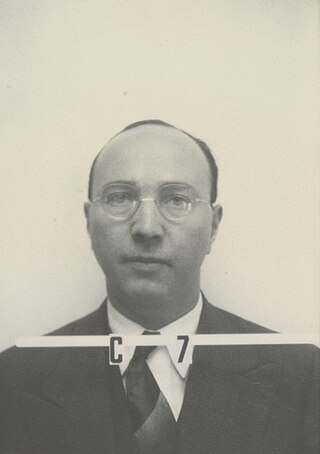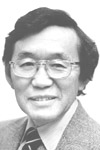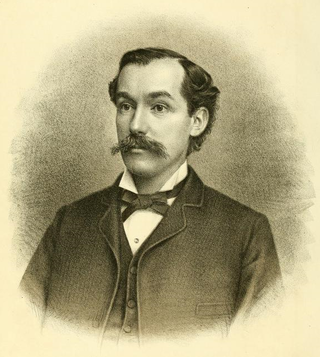
Michael I. Posner is an American psychologist who is a researcher in the field of attention, and the editor of numerous cognitive and neuroscience compilations. He is emeritus professor of psychology at the University of Oregon, and an adjunct professor at the Weill Medical College in New York. A Review of General Psychology survey, published in 2002, ranked Posner as the 56th most cited psychologist of the 20th century.
Thomas Eugene Shenk is an American virologist. He is currently Emeritus Professor of Life Sciences in the Department of Molecular Biology at Princeton University.

Elmer Drew Merrill was an American botanist and taxonomist. He spent more than twenty years in the Philippines where he became a recognized authority on the flora of the Asia-Pacific region. Through the course of his career he authored nearly 500 publications, described approximately 3,000 new plant species, and amassed over one million herbarium specimens. In addition to his scientific work he was an accomplished administrator, college dean, university professor and editor of scientific journals.

Atta-ur-Rahman, h-index 75, with 36,000 citations is a Pakistani organic chemist and is currently serving as Professor Emeritus at the International Center for Chemical and Biological Sciences at the University of Karachi and as Chairman of PM Task Force on Science and Technology. He has twice served as the President of Pakistan Academy of Sciences. He was the Federal Minister of Science and Technology (2000-2002), Federal Minister of Education (2002) and Chairman Higher Education Commission with status of Federal Minister (2002-2008) He is also the President of the Network of Academies of Sciences in Countries of the Organisation of Islamic Countries (NASIC). After returning to Pakistan from Cambridge after completing his tenure as Fellow of Kings College, Cambridge University, he contributed to the development of the International Center for Chemical and Biological Sciences at the University of Karachi, and transforming the landscape of higher education, science and technology of Pakistan. He is Fellow of Royal Society (London), Life Fellow of Kings College, Cambridge University, UK.,, Academician Chinese Academy of Sciences and Professor Emeritus at University of Karachi
Eugene "Gene" CharlesUlrich is an American Dead Sea scrolls scholar and the John A. O'Brien Professor emeritus of Hebrew Scripture and Theology in the Department of Theology at the University of Notre Dame. He is chief editor of the biblical texts of the Dead Sea scrolls and one of the three general editors of the Scrolls International Publication Project. Ulrich has worked under two editors in chief on the scrolls project, namely John Strugnell and Emanuel Tov.

Walter R. Tschinkel is an American myrmecologist, entomologist and Distinguished Research Professor of Biological Science and R.O. Lawton Distinguished Professor emeritus at Florida State University. He is the author of the Pulitzer Prize nominated book The Fire Ants, the book Ant Architecture: The Wonder, Beauty, and Science of Underground Nests, and more than 150 original research papers on the natural history, ecology, nest architecture and organization of ant societies; chemical communication in beetles; and the mysterious fairy circles of the Namib desert. His casts of ant nests and botanical drawings appear in numerous museums of art and natural history, from Hong Kong to Paris.
Robert H. Burris was a professor in the Biochemistry Department at the University of Wisconsin-Madison. He was elected to the National Academy of Sciences in 1961. Research in Burris's lab focused on enzyme reaction mechanisms, and he made significant contributions to our knowledge of nitrogen fixation.

Joseph Oakland Hirschfelder was an American physicist who participated in the Manhattan Project and in the creation of the nuclear bomb.
Paul Jackson Kramer was an American biologist and plant physiologist.

Govindjee is an Indian-American scientist and educator. He is Professor Emeritus of Biochemistry, Biophysics and Plant Biology at the University of Illinois at Urbana-Champaign, where he taught from 1961 until 1999. As Professor Emeritus since 1999, Govindjee has continued to be active in the field of photosynthesis through teaching and publishing. He is recognized internationally as a leading expert on photosynthesis.

Jerrold Meinwald was an American chemist known for his work on chemical ecology, a field he co-founded with his colleague and friend Thomas Eisner. He was a Goldwin Smith Professor Emeritus of Chemistry at Cornell University. He was author or co-author of well over 400 scientific articles. His interest in chemistry was sparked by fireworks done with his friend Michael Cava when they were still in junior high school. Meinwald was also a music aficionado and studied flute with Marcel Moyse – the world's greatest flutist of his time.
Asis Datta is an Indian biochemist, molecular biologist and genetic engineer, known for his research on genetically modified foods and food nutritional security. He was the founding Director of the National Institute of Plant Genome Research and is credited with the discovery of genes that assist in extended preservation of fruits and vegetables. He is a recipient of the Shanti Swarup Bhatnagar Award, the highest Indian award and in the Science category, and was awarded the fourth highest civilian award of the Padma Shri, by the Government of India, in 1999. In 2008, he was included again in the Republic Day Honours list for the third highest civilian honour of the Padma Bhushan.
Harlan Parker Banks was an American paleobotanist and Liberty Hyde Bailey Professor Emeritus in the College of Agriculture and Life Sciences at Cornell University, known for his studies of Devonian plants. A Fulbright Research Scholar and Guggenheim Fellow, he was a fellow of the American Association for the Advancement of Science, a member of the National Academy of Sciences, and president of the Botanical Society of America.
Hari Krishan Jain was an Indian cytogeneticist and plant breeder, known for his contributions to the field of genetic recombination and the control of interchromosome level. He is a former chancellor of the Central Agricultural University, Imphal, a former director of the Indian Agriculture Research Institute and a recipient of honours such as Rafi Ahmed Kidwai Award, Borlaug Award and Om Prakash Bhasin Award. The Council of Scientific and Industrial Research, the apex agency of the Government of India for scientific research, awarded him the Shanti Swarup Bhatnagar Prize for Science and Technology, one of the highest Indian science awards, in 1966, for his contributions to biological sciences. He received the fourth highest Indian civilian honor, the Padma Shri, in 1981.
Sushil Kumar was an Indian geneticist and academic, known for his Plant and microbial genetical genomics, especially the studies on Escherichia coli and Lambda phage as well as on the mutants of Rhizobium. He was a former director of the Central Institute of Medicinal and Aromatic Plants of the Council of Scientific and Industrial Research and an elected fellow of the Indian National Science Academy, National Academy of Agricultural Sciences, National Academy of Sciences, India, and Indian Academy of Sciences. The Council of Scientific and Industrial Research, the apex agency of the Government of India for scientific research, awarded him the Shanti Swarup Bhatnagar Prize for Science and Technology, one of the highest Indian science awards, in 1981, for his contributions to biological sciences.
José Sarukhán Kermez is a plant biologist and ecologist. He is currently the National Coordinator for Mexico’s National Commission for Knowledge and Use of Biodiversity (CONABIO). He received a B.A. from National Autonomous University of Mexico (UNAM) in 1964, a Masters from Postgraduate College (Chapingo), and a Ph.D. (Ecology) from the University of Wales. A known expert in the biodiversity of Mexico, Sarukhán’s main interests include tropical ecology, plant population ecology, and the systems ecology of both temperate and tropical ecosystems, as well as training and education. He has published over 110 research papers and authored and co-authored several books.

Eugene Wong is a Chinese-American computer scientist and mathematician. Wong's career has spanned academia, university administration, government and the private sector. Together with Michael Stonebraker and a group of scientists at IBM, Wong is credited with pioneering database research in the 1970s from which software developed by IBM, Microsoft, and Oracle descends. Wong retired in 1994, since then holding the title of Professor Emeritus of Electrical Engineering and Computer Sciences at University of California, Berkeley.

Tsune Kosuge was an American plant pathologist and plant biochemist who researched plant–microbe interactions. He was particularly known for his work on bacterial-synthesized plant hormones in plant tumors. He was a professor in the department of plant pathology at the University of California, Davis, from 1971 until his death, serving as departmental chair (1974–80).

Thomas George Gentry was an American educator, ornithologist, naturalist and animal rights writer. Gentry authored an early work applying the term intelligence to plants.









